8 classic films you should pair with Oscar Best Picture nominees

A Star is Born comes from a storied Hollywood legacy, marking the fourth iteration of a film to bear that title (and the fifth version of the story if you count 1932’s What Price Hollywood?). Thus, when it comes to this pairing, you have four options to choose from. Though the 1954 Judy Garland version and the 1976 Barbra Streisand version are arguably the most famous, the original 1937 outing is actually the best of the three. Starring Fredric March and Janet Gaynor as Norman Maine and Vicki Lester (née Esther Blodgett), the film charts a similar tale of a young undiscovered talent whose chance meeting with a mega-star and their blossoming romance helps propel her to fame just as her lover’s star is on the wane amidst his own battles with addiction. The 1937 film is a searing and witty take on the Hollywood studio system, examining the trappings of publicity manufactured fame and making winking reference to real stars and gossip of the day. Bradley Cooper’s version is less self-aware and more earnest in its sentiment, but it’s equally willing to interrogate the cost of fame and questions of authenticity and love. While Judy Garland’s musical numbers in the 1954 film are some of her most raw and emotionally vulnerable work, the 2018 and 1937 version share a well of deep emotion and feeling that the other two outings can’t match. Gaga and Gaynor are so effervescent and winning in their takes on nascent stardom that they are the perfect foil to the devastation of Cooper and March’s take on self-destructive tragedy. Like A Star is Born’s most recent round of FYC ads tout, these are movies that you feel — and they’ll both leave you far from the shallow of your emotions.
Available on: Amazon Prime, Kanopy
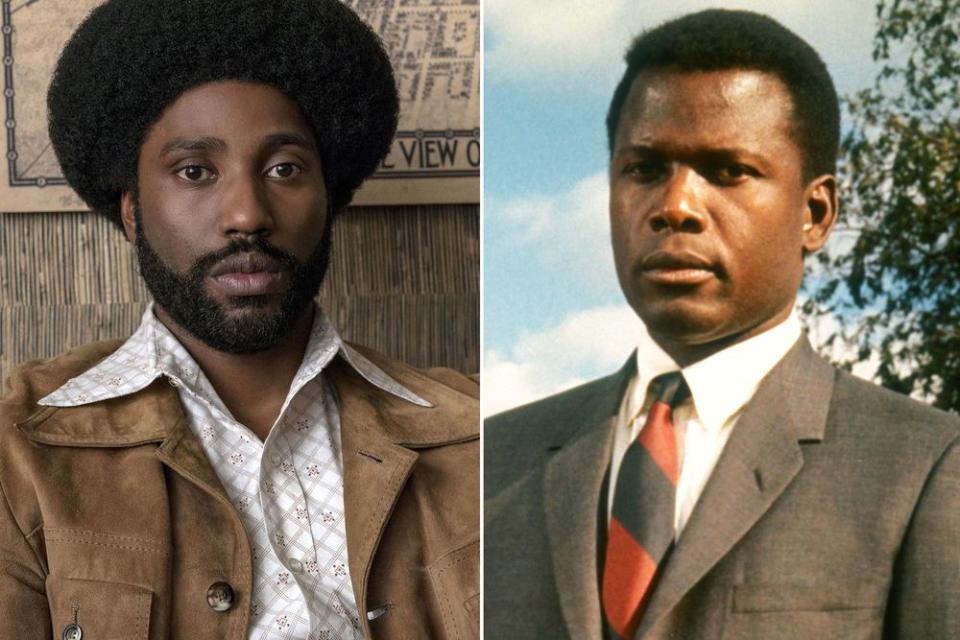
Spike Lee’s stranger-than-fiction film is based on the real-life tale of a black Colorado Springs police detective who managed to infiltrate a local branch Ku Klux Klan with the help of another white officer assuming his identity. The project is both a potent period piece set against the backdrop of the 1970s civil rights movement and a searing examination of our current political moment. Norman Jewison’s 1966 detective drama In the Heat of the Night similarly had its finger on the pulse of the burgeoning Civil Rights movement. Sidney Poitier stars as Virgil Tibbs, one of his most iconic roles, a black Philadelphia detective who becomes embroiled in a murder investigation in a small Mississippi town. Tibbs must partner with prejudiced Chief Gillespie (Rod Steiger) to solve the mystery amidst rampant racism and threats to his safety. The film marked one of the first mainstream Hollywood films to tackle the specter of racism in the American South in unflinching ways. Its story of a black detective mired in an investigation with racism at its core shares much narratively with BlacKkKlansman and both films are notable for their soundtracks. Lee’s makes expert use of music of the early 1970s era in which its set, while In the Heat of the Night turned to icon Quincy Jones to compose its blues-inspired score and write its title song, which Ray Charles then recorded to great acclaim. If there’s anything the events of the last two years and films arising out of this cultural climate have shown us, it’s that the horrors of racism and white supremacist aims are far from resolved — the films provide stirring bookends of these two distinct periods in history. Because it’s too late to turn back now.
Available on: Amazon Prime, YouTube, Google Play, iTunes

You’re probably wondering what on earth this movie about two white Depression-era bank robbers is doing next to this record-shattering film with a groundbreaking cinematic black superhero. After all, Black Panther and all of its many well-deserved milestones are important simply because so many of them are firsts. On the red carpet for the Black Panther premiere, Angela Bassett told EW the only black superhero she had to look up to when she was young was Shaft, the titular detective played by Richard Roundtree in the 1971 film (which is also a potential viewing option here). Yet, in the way that it is hopefully fundamentally altering the Hollywood landscape, Black Panther has much in common with Bonnie and Clyde. The 1967 film starring Faye Dunaway and Warren Beatty as the titular bank robbers ushered in a new era in Hollywood, fittingly known as New Hollywood. The film’s seeming glorification of murderers and thieves alongside its shockingly graphic violence broke new barriers in Hollywood, as did its roots in more experimental types of filmmaking like the French New Wave. In many ways, the shockwaves of Bonnie and Clyde’s impact on Hollywood is still felt today. With its history-making Oscar nominations and palpable influence of Afrofuturism, Black Panther has claimed a similarly potent place in Hollywood lore. There are also potent parallels between Black Panther villain Erik Killmonger (Michael B. Jordan) and Bonnie and Clyde themselves — individuals let down by the system who seek success and power by less than legal means. Killmonger was the first Marvel villain whose aims and aspirations felt viscerally valid to the audience, even if the way he went about achieving them subverted his own purpose. The same can be said of Bonnie and Clyde, anti-heroes of the Depression era who became icons of the counterculture era through their cinematic mythologizing. Many have drawn parallels between our current cultural and political moment and the upheaval of the 1960s — if Bonnie and Clyde was the rallying cry of counterculture cinema, let Black Panther stand for a new cinematic revolution. Wakanda Forever meet the ballad of Bonnie and Clyde.
Available on: YouTube, Google Play, iTunes

It’s hard to find a film pre-1980 (which is how we loosely are defining classic here) that in any way compares to a biopic of a rock band, but Lisztomania just might be the perfect match. The gonzo Ken Russell film stars The Who’s Roger Daltrey as classical composer Franz Liszt, situating him as the 19th century equivalent of a rock star. Daltrey also wrote lyrics for the film’s songs, which rocker Rick Wakeman composed, reworking synthesized arrangements of classical pieces by Liszt and Wagner. It captures the electric spirit and artistic process on display in much of Bohemian Rhapsody, a film which heavily uses montage to showcase Queen’s iconic recording sessions and concert tours. Similarly, Listzomania fixates on concert performances, love affairs, jealousies, and infidelities in much the same way as Bohemian Rhapsody. Both open with a flashback and a backstage view of their figure’s concerts. Liszt surprisingly has much in common with Freddie Mercury (Rami Malek) — both were often criticized and hailed for their outrageous showmanship which drew crowds of screaming fans, a fact which occasionally overshadowed their superb musicianship. These two films explore this to a degree, but it’s the way in which the movies participate in the mythologizing of their central figure that makes them a good match — a point hammered home by the casting of real-life rocker Roger Daltrey. Freddie Mercury wanted to write rock music on the scale of opera and classical music; Lisztomania takes that notion to a far more literal place. But they both will rock you.
Available on: YouTube, Google Play, iTunes, Vudu
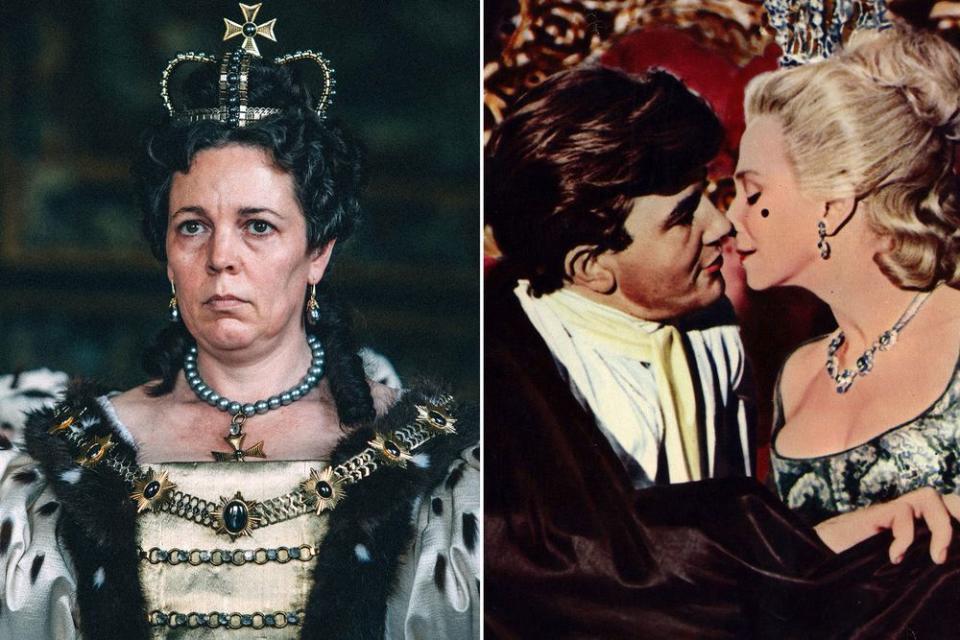
The Favourite’s absolutely bonkers take on the love triangle and rivalry between two cousins vying to be the court favourites of England’s Queen Anne is anything but your average historical drama. The outrageous Yorgos Lanthimos film throws the staid traditions of costume drama out the window. One previous historical film similarly shook up audiences with its bawdy humor, frank depictions of sexuality, and stylistic experimentation, including breaking the fourth wall – Tony Richardson’s Tom Jones. Albert Finney stars as the title character in this adaptation of Henry Fielding’s 1749 novel The History of Tom Jones, a Foundling. With its lush historical costumes, settings, and costumes, Tom Jones uses all the trappings of this style of filmmaking to utterly upend expectations, inserting experimental mock-serious commentaries in between scenes analyzing the characters’ actions. While The Favourite has a more straightforward narrative style, it similarly relies on its historical setting to pull the rug out from under the audience, devolving into shocking ribaldry and an examination of gender dynamics amidst its more traditional trappings. If you’re looking for a bawdy comedy equally as shocking and vibrant as The Favourite, you can’t go wrong with 1963 Best Picture winner Tom Jones.
Available on: Amazon, iTunes
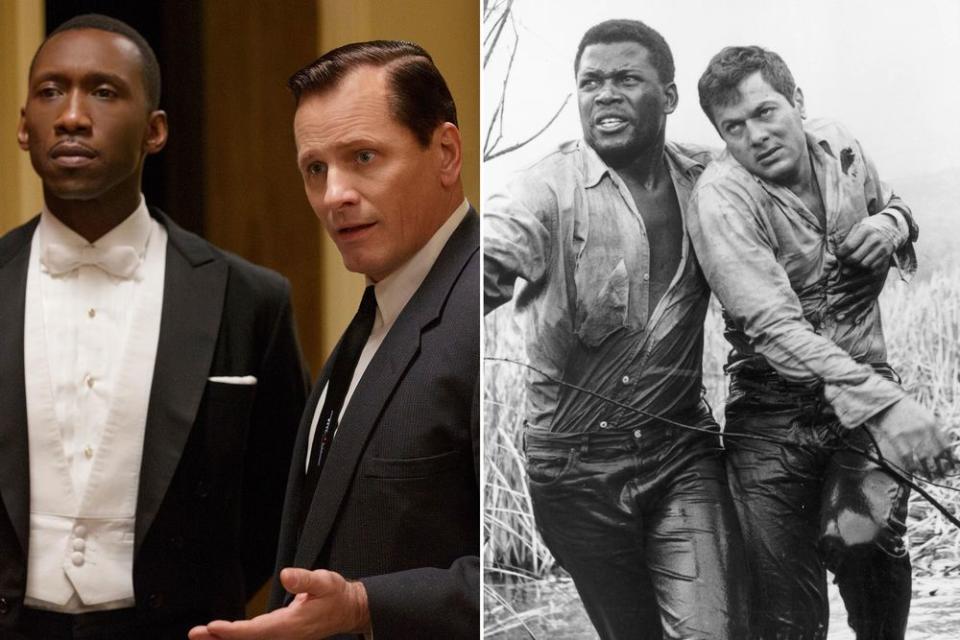
Green Book tells the story of Don Shirley (Mahershala Ali), a concert pianist, and Tony Lip (Viggo Mortensen), his Italian-American driver, as they travel through the segregated American South in the early 1960s. Though Tony originally takes the job for the cash, the two eventually forge an unlikely friendship amidst their experiences with the prevailing dehumanizing attitudes they encounter and the indignities Don Shirley faces at many of his concert venues. Though far more dramatic in its approach, The Defiant Ones is a similar tale of two unlikely partners who gain gradual respect and mutual regard for each other. Chained together as a joke by the warden, John “Joker” Jackson (Tony Curtis) and Noah Cullen (Sidney Poitier) must look to each other after escaping from an overturned prison transport truck. Though they initially hate each other, Cullen and Joker resign themselves to working together to escape their imprisonment. On their journey, they encounter a lynch mob and other terrors, gradually developing a friendship amidst the horrors they face. Poitier’s performance here earned him an Oscar nomination for his character’s quiet rage and intelligence, something that has also garnered Mahershala Ali plenty of awards love for his work in Green Book. Similar to Mortensen’s character in Green Book, Tony Curtis was hailed for his character’s transition from brutal tough guy to empathetic figure. Considered provocative in 1958, The Defiant Ones still stands as a searing meditation on everything from friendship to racism to prison reform.
Available on: Amazon Prime
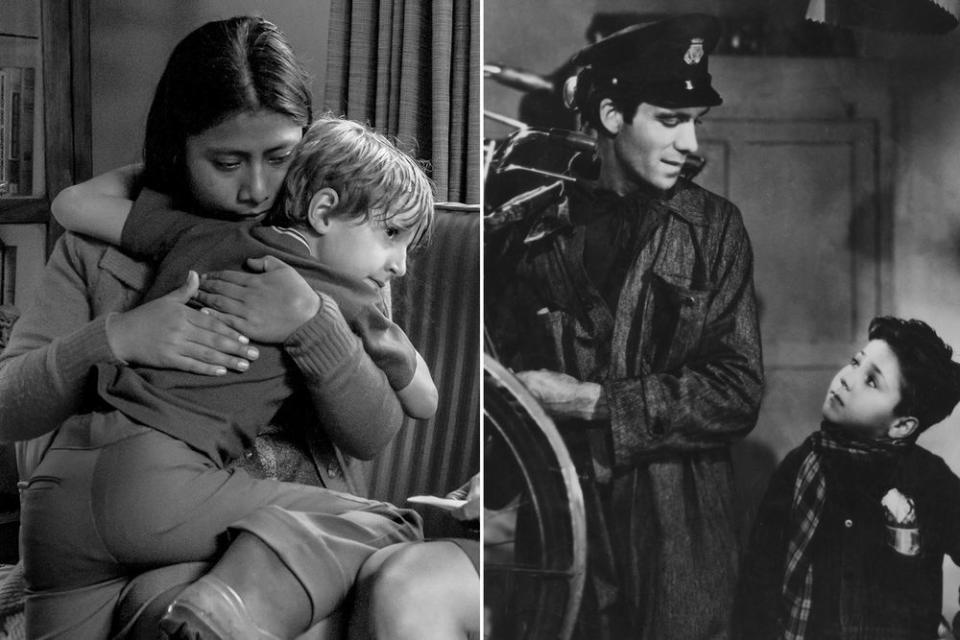
Roma has been hailed as a masterpiece by critics for its lush black-and-white cinematography and its intimately personal tale of live-in housekeeper Cleo (Yalitza Aparicio) and the middle-class family she cares for. Director Alfonso Cuarón is drawing from a rich history of hyper-realistic filmmaking with the project, relying on the techniques and styles of filmmaking schools like Italian Neo-Realism to craft this story of the minutiae of the lives of everyday people often overlooked by cinema. Vittorio De Sica’s Bicycle Thieves is the best-known film to emerge from the Italian NeoRealist movement — an unflinching and dispiriting tale of a man Antonio (Lamberto Maggiorani) desperate to find his stolen bicycle to keep the job he needs to support his family. Filmed on location in Italy, De Sica cast only untrained actors to tell this story that sets out to uncover the drama and heartbreak in everyday life. Similarly, Cuarón turned to untrained actress Yalitza Aparicio to ground his slice of life story shot on location in Mexico. Cuarón takes up a time-honored tradition of hyper-realistic black-and-white filmmaking used to examine the stories of those so often left off our screens, just as De Sica did back in 1948 with his frank look at the struggles of post-war life.
Available on: Kanopy, YouTube, Google Play, iTunes
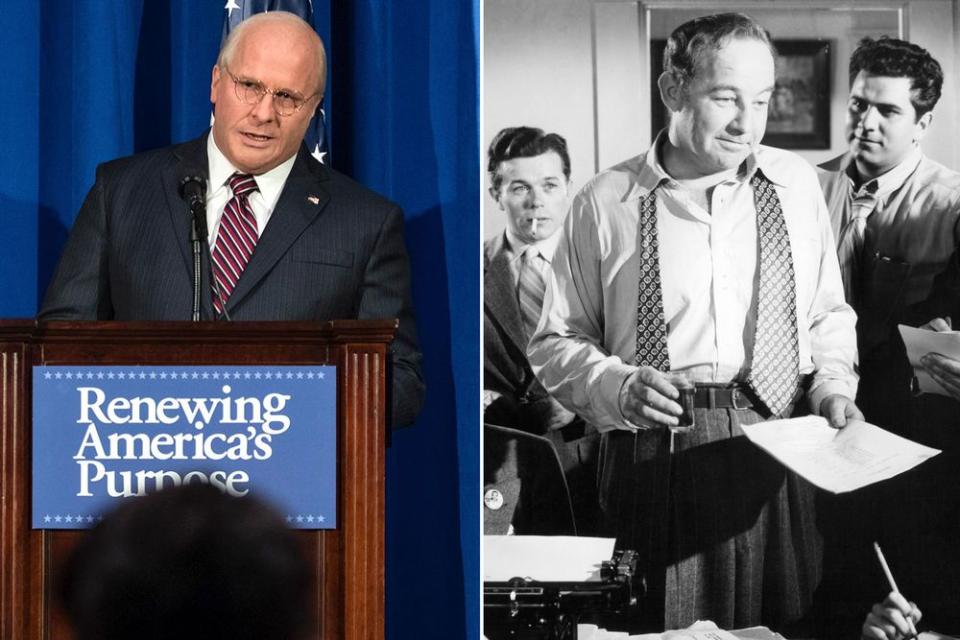
In essence, Vice is the story of how a rural party boy rose to one of the most powerful positions in American politics, all the while pulling the strings behind the curtain to his benefit. The black comedy from Adam McKay uses a host of cinematic tricks, including narration and filmic fake-outs to hammer home the corruption at the heart of Dick Cheney’s (Christian Bale) deeds, while contrasting those choices with the man’s dedication to his family. The 1949 film noir All the King’s Men follows a similar trajectory of rural politician Willie Stark (Broderick Crawford) to the governor’s mansion, where he becomes corrupted by the system that helped him rise to power. Its frank assessment of issues like graft, love, and how politics can subvert even the most idealistic among us jive well with the dark realities of Vice trussed up with McKay’s signature pitch-black sense of humor. All the King’s Men is widely considered to be a thinly veiled version of the rise of a real-life politician, 1930s Louisiana governor Huey Long, and his histrionic approach to politics and ultimate assassination. If you’re looking for a political biopic with extremely dark undertones, All the King’s Men, which earned leading man Broderick Crawford an Oscar, is the perfect running mate for Vice.
Available on: Amazon Prime, YouTube, Google Play, iTunes



